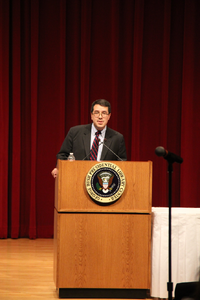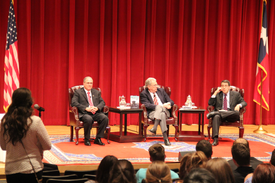By Charlotte Karrlsson-Willis,
Published October 17, 2014

Col (ret) Peter Mansoor, Dr. Charles Hermann, and Dr. Jasen Castillo during the 2014 Alexander Hamilton Society debate over the issue of deterring aggression in the world.
Are today’s major crises—ISIS, Ukraine— due to a decrease of strong US leadership across the globe, or is it actually caused by the excessive use of US military efforts in places where it might not be necessary or valuable to US interests? This discussion was at the core of the debate hosted by the Texas A&M chapter of the Alexander Hamilton Society on October 16, 2014. During the debate, which took place at the Presidential Conference Center, Colonel (ret) Peter Mansoor and Dr. Jasen Castillo tackled the issue of deterring aggression in the world. The Bush School’s Dr. Charles Hermann served as moderator.
The event brought two strong thinkers from different sides of issue; Mansoor, in addition to being a military professor, is a retired Colonel from the United States Army who was on the ground and part of the organization of the 2007 troop surge in Iraq as executive officer to General David Petraeus. Currently an assistant professor at the Bush School, Dr. Castillo has previously worked in the Department of Defense’s Policy Planning Office after working as an analyst at the RAND Corporation researching military strategy, nuclear deterrence, and WMD terrorism. Thus, from the outset, the debate was set to demonstrate two perspectives, an insider’s view from the military and an academic and analytical viewpoint.
A Core Difference

Dr. Jasen Castillo making a statement
The two very accomplished speakers agreed on many points, such as the issue of freeloading allies, the exaggeration of the threat posed by terrorism and the error in exporting or imposing democracy. However, the moderator— the Bush School’s Dr. Charles Hermann—managed to tease out the core difference between them. He then posited to Mansoor and Castillo, what is the real problem, too much or too little action? Castillo then boiled it down to this, “Your worry [Colonel Mansoor], is that allies will worry they’re being abandoned. Mine is that we’ll be entrapped.”
Withdrawn Too Far?
Castillo asked what are our real strengths and weaknesses. We excel at controlling the commons through air and sea power and our weakness lies in overambitious ground efforts. “Where we disagree is I don’t think we have to put forces on the ground everywhere. I want to emphasize less about our credibility and more about our allies,” he added. It is not in our interest to commit ourselves to a conflict if our allies that are directly involved are not stepping up themselves. If they do not see the threat as serious enough to engage, then perhaps it isn’t? Or as Castillo put it, “If our allies don’t want to put skin in the game, why should we?”
To Castillo’s charge that the United States needs to drawback its international actions, Mansoor argued we have already withdrawn too far from the global stage. “We aren’t pulling back a little, we’re pulling back a lot,” the former Army leader said.
Questions

The panel listens to questions from the audience
While the discussion between Castillo and Mansoor was enlightening, the highlight of the event was certainly the question and answer session in which both students and fellow faculty got in on the action, questioning the arguments made by the two speakers drawing from everything from current ISIS threats, Benghazi, and various aspects of NATO and its future.
Lively questions came from various members of the audience. A German student put the speakers on the spot asking if the US taking a more withdrawn role in NATO is the best way to prompt higher engagement by European nations, to which Mansoor answered, “Perhaps you could tell me how to get Europe to meet their obligations because we’ve reduced troop levels and they’ve continued to cut their defense. I’d love to force Europe to meet its commitments, but we need better leverage.”
There may not have been a clear answer to the question of how to deter aggression in today’s world Thursday night, or even which speaker had the stronger arguments. However, it was clear that the debate was a great success, with a line of people still wanting to ask questions and the speakers voicing dismay that the allotted time was over. “But we were just getting going,” the speakers said in dismay.
